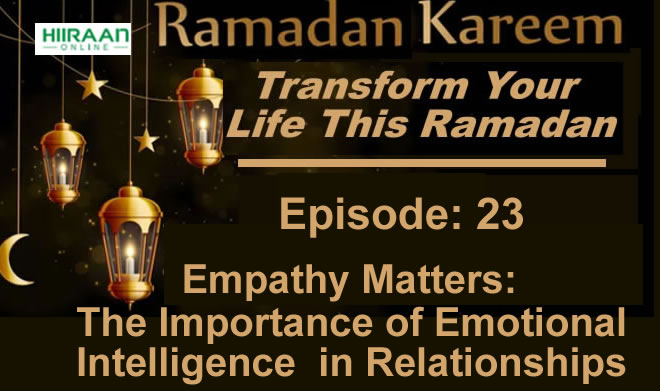by Safia Said
Friday April 14, 2023

Emotional intelligence,
commonly known as EQ, is the ability to understand, manage, and express one's
emotions, as well as to understand and influence the emotions of others. In
relationships, emotional intelligence plays a crucial role in fostering strong
connections and healthy communication between partners. In this article, we
will discuss the importance of emotional intelligence in relationships and
offer tips on how to improve it.
The
Importance of Emotional Intelligence in Relationships
Effective
communication is a key component of any successful relationship. Emotional
intelligence is the foundation of effective communication because it allows
individuals to understand and express their emotions in a healthy and
productive way. When partners are emotionally intelligent, they are better
equipped to resolve conflicts, empathize with each other, and build strong
connections.
One of the
primary benefits of emotional intelligence in relationships is the ability to
manage conflicts. Couples who have high levels of emotional intelligence are
better equipped to navigate conflicts and find solutions that work for both spouses.
When individuals are in touch with their emotions and can effectively express
them, they are less likely to feel resentful or unheard, which can lead to
further conflict. Furthermore, when individuals are able to empathize with
their partner's emotions, they are better able to approach conflicts in a
compassionate and respectful manner.
Another
important aspect of emotional intelligence in relationships is empathy. Empathy
is the ability to understand and share the feelings of another person. When spouses
are empathetic towards one another, they are more likely to be supportive and
caring during difficult times. Empathy also enables individuals to communicate
in a way that is sensitive to their partner's emotional state, which helps to
avoid misunderstandings and hurt feelings.
In
addition to improving communication and conflict resolution, emotional
intelligence also helps to build a strong emotional connection between
partners. Emotional intelligence allows individuals to understand and express
their own emotions, as well as to understand and respond to their partner's
emotional needs. This fosters a sense of intimacy and closeness that is
essential for a healthy and fulfilling relationship.
How to
Improve Emotional Intelligence in Relationships
Improving
emotional intelligence in relationships requires a conscious effort to become
more aware of one's own emotions and the emotions of others. Here are some tips
to help improve emotional intelligence in relationships:
§ Practice
self-awareness: Self-awareness is the first step in
developing emotional intelligence. Take time to reflect on your own emotions
and how they impact your behavior. Try to become more mindful of your emotional
state and how it affects your relationships.
§ Develop
empathy: To develop empathy, try to put yourself in your
partner's shoes and imagine how they might be feeling. Ask open-ended questions
to better understand their perspective and feelings.
§ Improve
communication skills: Practice active listening, express
yourself clearly and respectfully, and try to avoid making assumptions.
§ Manage
stress: Stress can impact emotional intelligence by clouding
judgment and making it difficult to manage emotions. Practice stress-management
techniques such as meditation or exercise to improve emotional regulation.
§ Seek
support: Working with a therapist or counselor can be a
helpful way to develop emotional intelligence in relationships. A therapist can
provide guidance and support to help you better understand your emotions and
how to express them in healthy ways.
In
conclusion, emotional intelligence is a critical component of healthy
relationships. By developing emotional intelligence, spouses can improve
communication, navigate conflicts, and build strong emotional connections.
Improving emotional intelligence requires self-awareness, empathy, effective
communication skills, stress management, and support from others. By
incorporating these strategies into daily life, individuals can improve their
emotional intelligence and build more fulfilling relationships.